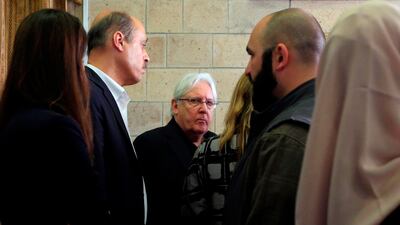The UN special envoy to Yemen held talks with Houthi leaders in the Sanaa on Sunday but left the rebel-held capital without any apparent progress towards salvaging a fragile ceasefire in Hodeidah and without visiting the port city as he had reportedly planned to do.
Martin Griffiths arrived in Sanaa on Saturday for the first time since the ceasefire was agreed at UN-brokered peace talks in Sweden last month.
The visit came as government forces and residents in Hodeidah reported an increase in Houthi attacks and the arrival of rebel reinforcements despite the ceasefire, which went into effect on December 18.
Mr Griffiths issued no statement after his talks with the rebels but pro-government forces in Hodeidah said he had failed to achieve a positive outcome.
"Mr Griffiths has not convinced the Houthis to withdraw from the city and its three ports because they are linking their withdrawal with the reopening Sanaa airport, which was not part of the Swedish peace deal," Col Wathah Al Dubaish, spokesman for the Amalikah Brigades, told The National.
Rebel leader Mohammed Ali Al Houthi told Agence France-Presse that he had suggested to Mr Griffiths that another round of peace talks "could take place soon in Amman or by video conference", but made no mention of the situation in Hodeidah.
UN officials said Mr Griffiths would fly to Riyadh on Sunday night for talks with President Abdrabu Mansur Hadi's government.
The UN envoy was also scheduled to meet in Sanaa with Patrick Cammaert, head of the UN monitoring team deployed in Hodeidah under a Security Council resolution endorsing the ceasefire deal. The retired Dutch general also chairs the Redeployment Co-ordination Committee, which includes rebel and government representatives.
According to the UN resolution, the warring parties must cease hostilities in Hodeidah province and remove their forces from Hodeidah city and its ports “within 21 days of the ceasefire coming into force”.
With the deadline just days away, "the only thing Mr Griffiths can do is extend the time of the ceasefire, giving the Houthis more time to keep up their dirty games in the city", Col Al Dubaish said.
He said leaders of the pro-government forces called an emergency meeting and agreed to send a letter to President Hadi and the Arab Coalition to warn them that “peace with the rebels will not be achieved by ignoring their attacks on Hodeidah".
_____________
Read more:
UN envoy Martin Griffiths returns to Yemen with Hodeidah truce in the balance
Yemen's Houthi rebels are undermining Hodeidah ceasefire, Security Council warned
_____________
According to a Yemeni government source, Mr Griffiths planned to press the Houthis to open humanitarian corridors for delivery of aid — one of the confidence-building measures agreed upon in Sweden as a precursor to further talks.
"The militias are putting what was agreed in Sweden at risk," the source said.
The UN says about 20 million Yemenis — two-thirds of the population — are dependent on humanitarian aid after nearly four years of war. Hodeidah is the entry point for about 70 per cent of the country's food and aid shipments, but most of it is being stolen by the Houthis, UN and government officials say.
Yemen's Minister of Local Administration, Abdul Raqeeb Fatah, said the Houthis had looted 65 per cent of the humanitarian aid sent through Hodeidah.
Speaking to the UAE state news agency Wam, Mr Fatah accused the rebels of "wilful disregard" for the plight of the Yemeni people over the past three years.
"Under the pretext of 'the war effort', the militias plundered and seized by force 697 relief trucks using the roads linking Hodeidah to Sanaa, Ibb, Taez, Hajjah and Dhamar, as well as goods entering the governorates under the Houthis’ control," said Mr Fatah, who also chairs Yemen's Higher Committee for Relief.
He said the rebels detained 88 relief and commercial vessels at Hodeidah and Al Salif ports, 34 of which had cargoes that got spoiled and damaged after being held for more than six months.
The UN's World Food Programme has threatened to cut off aid deliveries to rebel-held areas because much of it was not reaching the people, citing photographic evidence showing rebels seizing food and manipulating lists of aid recipients.
“If you don’t act within 10 days, the WFP will have no choice but to suspend the assistance ... that goes to nearly three million people,” director David Beasley wrote in a letter to the Houthi leader on January 1. “This criminal behaviour must stop immediately.”
The WFP however dismissed allegations by Mr Fatah on Sunday that the rebels had seized 72 of its relief trucks.
"These are already at a checkpoint for inspection; they're not in the hands of anyone, they've just been delayed," Abeer Etefa, senior WFP regional communications officer for the Middle East, told The National.
“They have been blocked on the road to Ibb by customs; they are awaiting clearance, this is normal practice," she said. "They’ve been there for two to three days. They check the food quality and quantity and make sure there is no rotten food. It normally takes two days, so it’s taken one day longer than usual.”
Ms Etefa also refuted local reports that Houthi rebels had attacked WFP stores at a warehouse in Hodeidah.
“The warehouse is no longer under our contract. For the past three months, we have nothing in this warehouse,” she said.

